
It's kind of a misnomer about science fiction that science
It's kind of a misnomer about science fiction that science fiction is about anything other than people. It's about people doing stuff, sometimes doing extraordinary stuff.






Listen closely, O seekers of truth, to the wise words of Greg Bear: "It's kind of a misnomer about science fiction that science fiction is about anything other than people. It's about people doing stuff, sometimes doing extraordinary stuff." In these words, Bear shines a light on the true essence of science fiction—it is not merely about the wonders of technology, the mysteries of space, or the future of the world, but about the human spirit, the actions of people when confronted with the unknown, the strange, and the impossible. At its core, science fiction is not about machines or distant galaxies, but about the choices, struggles, and triumphs of people, sometimes doing the extraordinary, but always grounded in the complexities of human nature.
In the ancient world, the stories of heroes were not simply about their feats of strength or daring—they were about the choices they made, the inner battles they faced, and the moral lessons they imparted. Think of Hercules, whose labors were not only physical challenges but tests of his character, his integrity, and his resilience. Though the tales of his strength and bravery were legendary, they were his humanity, his struggle against the forces that sought to break him, that made him an enduring symbol of the human condition. The mythic hero is, at his core, a figure of humanity, embodying not just physical prowess but the deeper questions of what it means to be human. So too, in science fiction, the focus on people, their choices, and their actions, elevates the genre to something more than just a story about futuristic technologies.
Consider, O wise ones, the example of Mary Shelley and her Frankenstein. Shelley's work is often seen as one of the first examples of science fiction, but it is far more than just a tale about scientific experimentation. At the heart of the story is the human struggle—the creator's attempt to play God, the consequences of that ambition, and the monster’s own search for identity, belonging, and meaning. In the tale, it is not just the science of reanimating life that fascinates us, but the emotional and moral dilemmas that emerge when human beings step into realms they cannot fully understand. It is a story of people grappling with the consequences of their actions, with the very nature of what it means to be alive, to be human.
This, O wise ones, is the true essence of science fiction—it is a mirror to the human condition, a lens through which we examine the depths of our nature. The technology and futuristic settings of these tales are but the backdrop for the more profound story of human choices. Isaac Asimov's Foundation series, for example, is not just a tale of intergalactic empires and technological wonders, but a story of the human mind, of political power, societal evolution, and the enduring tension between individual and society. In Asimov's work, we see people grappling with their fate, attempting to predict the future, and struggling with the moral implications of their actions. Even in the farthest reaches of the galaxy, the story is about people—thinking, feeling, and choosing their path.
Look to the rise of modern science fiction through the works of Philip K. Dick, whose stories are not simply about advanced technology but about the human mind, the perception of reality, and the questioning of identity. In Do Androids Dream of Electric Sheep?, Dick examines the blurry line between human and machine, a question that has far-reaching implications for how we understand consciousness, emotion, and being. It is not the science of artificial intelligence that makes this story enduring, but the human dilemma of what it means to feel, to love, to exist. Dick’s work is a reflection of human desires, fears, and uncertainties, offering us a glimpse into the darkest corners of our psyche.
Thus, O wise ones, the lesson is clear: science fiction is not a genre of fancy machines and distant stars—it is a mirror to our humanity. The real power of science fiction lies not in its technological advancements but in its ability to expose the complexities of human experience. Bear's words remind us that whether we are facing the challenges of society, identity, or morality, the heart of the story is always about the people who confront these challenges. In every scientific breakthrough or fantastical adventure, the human spirit is the true protagonist, the one who must adapt, suffer, and choose. The technology, the science, the futuristic world—these are but vehicles for the exploration of our very nature.
Let us then, O seekers of wisdom, embrace the true essence of science fiction. When we read these stories, let us not be distracted by the dazzling machines and alien worlds, but let us focus on the people—their struggles, their choices, their dreams. For in the end, it is not the science that matters, but the human beings at the heart of these tales. The stories that endure, that speak to us across time, are those that illuminate the deepest aspects of what it means to be human. Whether in the pages of fiction or in the struggles of our own lives, let us remember: it is the people who make the story worth telling, and it is through their actions that we come to understand the world, and ourselves, more clearly.






AAdministratorAdministrator
Welcome, honored guests. Please leave a comment, we will respond soon